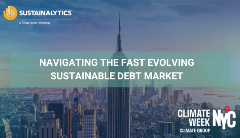Bringing Investors and Companies Together to Accelerate Human Rights Progress
Human rights issues have been rising on the responsible investment agenda in recent years. The COVID-19 pandemic and the Black Lives Matter movement have provoked even more pointed discourse on the topic. The European Union’s current efforts to introduce rules to hold companies accountable for social and environmental risks in their supply chains further accelerate that ascent. This wave of legal requirements and normative expectations is impacting financial markets worldwide, with responsible business regulations already in place or quickly becoming valid.
Climate Week NYC: Navigating the Fast Evolving Sustainable Debt Market
While global green bond issuance has been growing rapidly, these instruments still represent a niche segment of the global bond market. Join Sustainalytics during Climate Week NYC for a virtual event on Navigating the Fast-Evolving Sustainable Debt Market.
Know Where You Stand With Corporate ESG Benchmarking
In this post we discuss why companies should generate a corporate ESG benchmark against their peers, explain how they can go about this exercise, and highlight how they can use that information to advance and enhance their own corporate ESG initiatives.
Impact of Climate Change and Extreme Weather on Essential Services
Utilities have found themselves in the literal and metaphorical eye of the storm over the last year as hurricanes, floods and wildfires of increasing frequency and strength have wreaked damage on their assets. In late August, Storm Ida made landfall in Louisiana, USA and devastated the power grid lines. Entergy, the utility operating in Louisiana, supplying most of New Orleans, restored 90% of the supply only by mid-September, with 87,000 customers still without power.
What’s Happening in Sustainable Finance: Key EU Developments and the Untapped Market of Climate-Aligned Bonds
Covering summer developments in the global sustainable finance market, including the launch of the EU’s renewed sustainable finance strategy, the publication of the Social Loan Principles and the EU Green Bond Standard, and the continuing growth in the sustainable bond and loan markets.
The circular way forward could be the key to reducing food waste
Indications that a food crisis is imminent are clear. Fundamental changes in the global food system are required to address these challenges. This decade is a watershed moment for urgent efforts to close the loop, and companies and investors can play a pivotal role. Despite being closely connected to issues such as climate change and basic human rights, food waste has attracted comparatively less attention from companies, investors, and other stakeholders.
Human Rights Accelerator
This thematic engagement aims to improve the adoption of globally agreed corporate standards for managing and promoting human rights, as defined by the UN Guiding Principles on Business and Human Rights (UNGPs) and mirrored in the OECD Guidelines for Multinational Enterprises.
On-Demand Video: How Covid-19 & Vaccination Program Analysis is Integrated into Country Risk Ratings
The Covid-19 pandemic is widely considered one of the largest global challenges of the past decade, the systemic event has caused governments and citizens to respond as such. Learn how Sustainalytics are assessing the response and integrating the data into Country Risk Ratings.
Recent market trends put engagement and voting front and centre for responsible investors
From a market perspective, engagement and voting on governance issues have been used as levers for influence for a long time. On the other hand, environmental and social issues were historically addressed from a values-based perspective or primarily for fact-finding purposes. Today, many responsible investors leverage corporate dialogue as a tool to influence and drive meaningful change and impact
North American Material Risk Engagement Trends: ESG Reporting Frameworks, Emission Reduction Targets and Beyond
There are many factors that rating agencies consider within its overall assessment. For example, ESG rating companies tend to look for at least three years of ESG metrics to determine company trends and long-term ESG targets, goals, and strategies to manage and reduce ESG risks at least five years ahead. Read on to learn about how Sustainalytics' Material Risk Engagement program promotes and protects long-term value by engaging with high-risk companies on financially-material ESG issues. (A North American Snapshot)
Sustainability-Linked Debt Financing: The View from Down Under
For Australia, a country whose economy is historically rooted in heavy-emitting, hard-to-abate sectors, sustainability-linked debt financing could provide the spark needed to accelerate emission reductions and transition to a low-carbon economy.



















